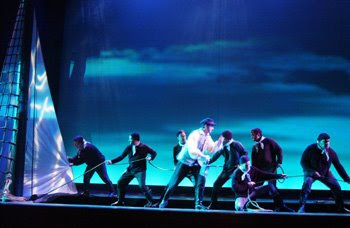
Chapter Three, Part I
The Forbidden Singer
The first memory I have of operatic singing was my mother quietly chanting “Che gelida manina” (“What tiny, cold hands”) as she stretched a pair of mittens over the ends of my fingers. My father was in the kitchen drinking coffee, and could not hear.
From what I am able to remember, my mother’s voice was even stronger than my grandmother’s, endowed with the same delicate agility but possessing also an emanating butterscotch warmth, something I would hear years later in Tebaldi and identify by the enigmatic Italian term “spinto.” (Crudely put, “spinto” is the ability to stuff a hall up to the rafters with sound, seemingly without the intention to do so.)
My mother would only sing when my father was away on one of his long sales trips. A week after he left, my mother would begin to hum; a week later she would graduate to trills, and melodies sung on nonsense syllables. A few days later she would be pouring Italian arias over my pancakes like maple syrup, and by the end of the week she was performing the final act of “Rigoletto,” singing mostly Gilda but also the intervening parts of Maddalena, Rigoletto, Sparafucile, the Duke of Mantua, and even the men’s chorus, ghosting away offstage with their thunderstorm chromatics.
Two nights later, she was entertaining me and my infant brother Bobby with the mad scene from “Lucia di Lammermoor,” kitchen knife held up in her hands, splotches of ketchup spilled on her apron to pass for the blood of her freshly murdered husband – when my father walked in, home a week early. My mother shrieked a high D across the living room, then stood there shrinking under my father’s quiet stare, her spine jacking down like some sort of hydraulic lift. She set the knife on the couch and crept upstairs to their bedroom, where she stayed for the next three days, pleading illness. The following day, my father went to work and asked for a demotion back to the home office. It was six months later, after family finances forced my father back to the road, before my mother worked her way back to a trill, released into the air like a renegade hummingbird as she hung laundry on the clothesline.
The Forbidden Singer
The first memory I have of operatic singing was my mother quietly chanting “Che gelida manina” (“What tiny, cold hands”) as she stretched a pair of mittens over the ends of my fingers. My father was in the kitchen drinking coffee, and could not hear.
From what I am able to remember, my mother’s voice was even stronger than my grandmother’s, endowed with the same delicate agility but possessing also an emanating butterscotch warmth, something I would hear years later in Tebaldi and identify by the enigmatic Italian term “spinto.” (Crudely put, “spinto” is the ability to stuff a hall up to the rafters with sound, seemingly without the intention to do so.)
My mother would only sing when my father was away on one of his long sales trips. A week after he left, my mother would begin to hum; a week later she would graduate to trills, and melodies sung on nonsense syllables. A few days later she would be pouring Italian arias over my pancakes like maple syrup, and by the end of the week she was performing the final act of “Rigoletto,” singing mostly Gilda but also the intervening parts of Maddalena, Rigoletto, Sparafucile, the Duke of Mantua, and even the men’s chorus, ghosting away offstage with their thunderstorm chromatics.
Two nights later, she was entertaining me and my infant brother Bobby with the mad scene from “Lucia di Lammermoor,” kitchen knife held up in her hands, splotches of ketchup spilled on her apron to pass for the blood of her freshly murdered husband – when my father walked in, home a week early. My mother shrieked a high D across the living room, then stood there shrinking under my father’s quiet stare, her spine jacking down like some sort of hydraulic lift. She set the knife on the couch and crept upstairs to their bedroom, where she stayed for the next three days, pleading illness. The following day, my father went to work and asked for a demotion back to the home office. It was six months later, after family finances forced my father back to the road, before my mother worked her way back to a trill, released into the air like a renegade hummingbird as she hung laundry on the clothesline.
Next: Gabriella’s Diva Cafe
Find Gabriella’s Voice at: http://search.barnesandnoble.com/Gabriellas-Voice/Michael-j-Vaughn/e/9781929429950/?itm=1
Image: Rochelle Bard in Opera San Jose’s 2007 Lucia di Lammermoor. Photo by Pat Kirk.


